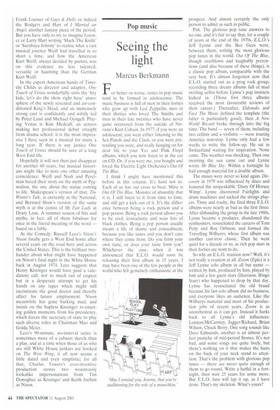Pop music
Seeing the light
Marcus Berkmann
For better or worse, tastes in pop music tend to be formed in adolescence. The music business is full of men in their forties who grew up with Led Zeppelin, men in their thirties who loved The Smiths and men in their late twenties who have never quite recovered from the suicide of Nirvana's Kurt Cobain. In 1977, if you were an adolescent, you were either listening to the Sex Pistols and the Clash, or you were pretending you were, and really hanging on for dear life to your Yes and Pink Floyd albums, which you now listen to in the car on CD. Or, if you were me, you bought and loved the Electric Light Orchestra's Out Of The Blue.
I think I might have mentioned this before in this column. It's hard not to. Each of us has our cross to bear. Mine is Out Of The Blue. Monster of absurdity that it is, I still listen to it from time to time, and still get a kick out of it. It's the difference between being a rock person and a pop person. Being a rock person allows you to be cool, iconoclastic and wear lots of black clothes. Being a pop person usually means a life of shame and concealment, because you like tunes and you don't care where they come from. Do you form your own taste, or does your taste form you? Whichever the case, when it was announced that E.L.O. would soon be releasing their first album in 15 years, I may have been one of the few people in the world who felt genuinely enthusiastic at the
prospect. And almost certainly the only person to admit as such in public.
Pah. The glorious pop tune answers to no one, and it's fair to say that, for a couple of years at the end of the 1970s, E.L.O.'s Jeff Lynne and the Bee Gees were, between them, writing the most glorious pop tunes in the world. Out Of The Blue, though overblown and laughably pretentious (and also because of these things), is a classic pop album, comparable with the very best. It's almost forgotten now that E.L.O. started out as a prog rock group, recording three dreary albums full of mad swirling cellos before Lynne's pop instincts kicked in. (Those first three albums received the most favourable reviews of their career.) Thereafter, Eldorado and Face The Music defined the template (the latter is particularly good), then A New World Record broke through into the big time. The band — seven of them, including two cellists and a violinist — were touring America non-stop. Lynne only had a few weeks to write the follow-up. He sat in Switzerland waiting for inspiration. None came. The weather was shocking. Then one morning the sun came out and Lynne wrote Mr Blue Sky. Within a fortnight he had enough material for a double album.
The muses were never so kind again. Discovery in 1979 was influenced by disco and featured the unspeakable 'Diary Of Horace Wimp'. Lynne discovered Fairlights and drum machines and sacked the strings players. Tinny and trashy, the final three E.L.O. albums were nearly as bad as the first three. After disbanding the group in the late 1980s, Lynne became a producer, abandoned the synthesisers, resuscitated the careers of Tom Petty and Roy Orbison, and formed the Travelling Wilburys, whose first album was another cast-iron classic. Then he went quiet for a decade or so, as rich pop stars in their forties are wont to do.
So why an E.L.O. reunion now? Well, it's not really a reunion at all. Zoom (Epic) is a Jeff Lynne solo album in all but name — written by him, produced by him, played by him and a few guest stars (Harrison, Ringo Starr) who happened to drop by that day. Lynne has resuscitated the old brand because his last solo album did no business, and everyone likes an audience. Like the Wilburys material and most of his production jobs of recent years, Zoom is as unorchestral as it can get. Instead it harks back to all Lynne's old influences: Lennon/McCartney, Jagger/Richard, Brian Wilson, Chuck Berry. One song sounds like Dave Edmunds, another is an almost perfect pastiche of mid-period Stones. It's not bad, and some songs are quite lively, but there's nothing on it that makes the hairs on the back of your neck stand to attention. That's the problem with glorious pop tunes — there are never quite enough of them to go round. Write a hatful in a fortnight, then wait 25 years for some more. But E.L.O. fans will lap it up, as I have done. That's my skeleton. What's yours?


























































 Previous page
Previous page